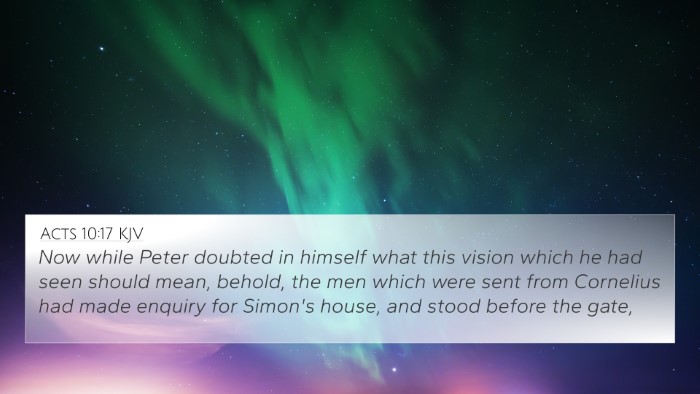Understanding Acts 11:11
In Acts 11:11, we witness a pivotal moment in the early Church where Peter recounts an experience that not only shaped his understanding but also the trajectory of the apostolic mission. The verse states:
"And behold, immediately there were three men already come unto the house where I was, sent from Caesarea unto me." (Acts 11:11 KJV)
Verse Meaning and Context
This verse occurs during a significant transition period where the Gospel is starting to reach Gentiles. Peter had just experienced a vision that challenged long-standing Jewish laws concerning ritual cleanliness and dietary restrictions.
Commentary Insights
- Matthew Henry: He elucidates that Peter's recounting of the vision indicates divine guidance to accept what God has cleansed, emphasizing God's intention to extend salvation beyond the Jews. Henry notes the importance of recognizing God's workings in unexpected ways.
- Albert Barnes: Barnes points out that the arrival of three men from Caesarea is significant as they represent the Gentile inclusion in the Christian faith. He highlights Peter’s obedience to the Holy Spirit and his realization that salvation is available to all, not just a select few.
- Adam Clarke: Clarke elaborates on the supernatural aspect of the event where Peter is led by the Spirit to interact with these Gentiles. He mentions the urgency of the message being sent to Peter, showing God's sovereign plan unfolding through prompted events.
Cross-References and Thematic Connections
Acts 11:11 is interconnected with numerous verses throughout the Bible, illustrating the theme of the Gentiles being brought into the fold of God's redemptive plan. Here are Bible verses that cross-reference and illuminate this theme:
- Acts 10:44-48: The account of Cornelius, where Peter first understood the message for the Gentiles.
- Ephesians 3:6: Paul speaks of the inclusion of Gentiles as fellow heirs, which aligns with the message Peter receives.
- Romans 1:16: Paul affirms that the Gospel is for everyone, starting with the Jew and then for the Greek.
- Galatians 3:28: A declaration that there is no distinction between Jew and Gentile in Christ.
- John 10:16: Jesus mentions other sheep not of this fold, hinting at the Gentile inclusion.
- Isaiah 49:6: A prophetic declaration that salvation would extend to the ends of the earth.
- Matthew 28:19: The Great Commission to make disciples of all nations resonates with this theme.
Applications and Lessons
Acts 11:11 teaches us about God's sovereignty over salvation and the inclusiveness of His Kingdom. Here are some practical applications:
- Embrace Diversity: The early Church's acceptance of Gentiles should inspire us to embrace diversity within our communities.
- Listening to God's Direction: Peter's attentiveness to the Spirit’s directive serves as a reminder for us to be receptive to God’s guidance.
- Courage to Share the Gospel: Like Peter, we are called to break barriers and share the Gospel with everyone regardless of their background.
Theological Implications
The implications of Acts 11:11 extend beyond its narrative context, touching on key theological themes:
- Grace and Salvation: The story emphasizes that salvation is a gift from God, freely given to all who believe.
- Barriers Broken: The verse signifies the breaking down of cultural and religious barriers in the church.
- Unity in Christ: The inclusion of Gentiles highlights the unity that believers have in Christ, transcending ethnic divisions.
Conclusion
Acts 11:11 opens a crucial discussion on the early Church's expansion and the breaking down of barriers that prevented the spread of the Gospel. By understanding this verse in light of the broader Biblical narrative and interconnections, we gain insights into God's inclusive plan for humanity.






